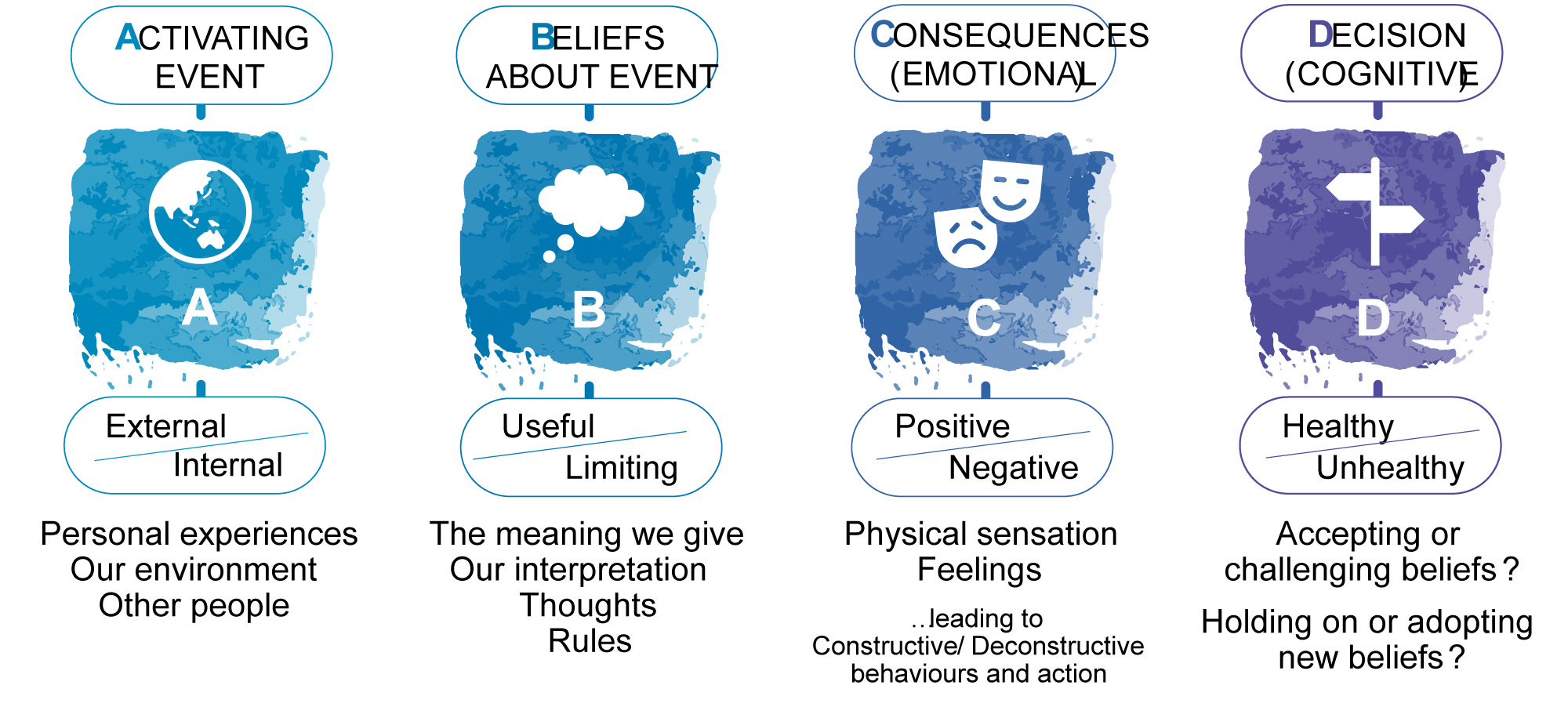‘A’ = Activating event | Encompassing an external event that has occurred, a future event that we anticipate occurring, or an internal event in our mind, such as an image, memory, or dream. ‘A’ is often referred to as our ‘trigger’.
‘B’ = Beliefs | Including our thoughts, personal rules, demands we make or expectations we have (of ourselves, the world, other people), and the meaning we attach to external and internal events.
‘C’ = Consequences | Including our emotions, behaviours, and physical sensations that accompany different emotions.
As we already touched on, we generally assume that ‘A’ causes ‘C’ (A: Incompetent people = C: They make me feel annoyed and frustrated).
Interestingly, it is not ‘A’ that causes ‘C’, but rather ‘B’, our beliefs, that cause ‘C’ (B – personal rules, demands, expectations – “I believe that by now they should know how to do their job” = C: Feeling annoyed and frustrated).
Therefore, the time has come for:
‘D’ (Decision making) | Challenging our beliefs and adopt more useful/healthier beliefs that provide us with ‘C’ (positive emotional consequences and constructive behaviours and actions) to achieve our desired outcomes. A more useful belief around ‘never finding suitable staff’ could for example be: “I believe that we must improve our hiring process and ensure we attract more qualified employees to our organisation.”
So, what are thoughts and beliefs?
Over 60,000 thoughts per day are our constant companion, more intense than the relationship with our best friend. So, we better make sure they are positive and supportive ones! Simply put, thoughts are limiting and/or empowering Questions and/or Statements (often expressed through Beliefs) inside our head.
Our brain works like a Google search engine, and thoughts are where we put our focus and what we look for. Questions we ask ourselves can be limiting/low quality or empowering/high quality, and thus will either limit us in our thinking, actions and results, or empower us with anything we do. When we ask ourselves limiting questions, we ask for example: “Why am I…”, or “Why does everyone always…”. These limiting WHY questions place us into victim mode and justify why we face a particular problem (not to be mistaken for the important ‘WHY = Purpose in life’ questions)
By contrast, when we ask ourselves empowering/high quality questions, we ask for example: “What is good about this situation?”, or “How can I change this situation?” WHAT and HOW questions are of empowering because they provide us with solutions to our challenges. Hence, to harness the power of thoughts, we must ask ourselves high-quality, solution-based questions.
Our beliefs are developed to support what we initially told ourselves during an event, and then we go searching for evidence, or proof, of this belief. Our personalities, attributes, values and beliefs are shaped when we are fairly young, and unfortunately, we stop updating that information. We go along, without questioning, with what we have absorbed like sponges when we lived with our families, our tribe, our school friends, etc. Unfortunately, most of us stay with these beliefs without questioning them at a later stage. If we want to empower ourselves and unlock our EI to change our life for the better, we need to renew the beliefs that are no longer true.
Connect with your inner CEO
To explain how closely indeed Thoughts and Emotional State are interlinked, we can compare ourselves to a cruise liner and ask the question of who is essentially running the ship? Is it the captain, the ultimate decision-maker and bearer of responsibility on board? Or is it the crew in its entirety that keep the daily operations going? Indeed, it is the combination of both, and if the connection and communication between the two go down, so does creation and our mighty cruise ship might face mutiny.
How can we avoid mutiny within ourselves and others around us? If the captain is the brain of the ship (mental health, conscious mind, IQ) then the crew is the heart of the ship (emotional wellbeing, unconscious mind, EI), then which one is in control of the other? The answer is simple: neither. We must bring what we think and feel in harmony to experience a positive psychological and physiological state. This way, connection and communication go up, and so does creation.













